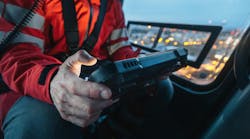By an 8-5 vote, the Dallas City Council approved a policy Wednesday that will require private security officials to verify the validity of a commercial alarm before police officers respond.
Police will continue to respond to businesses' 911 calls and human-activated panic-button alarms.
The decision which came after several months of debate, including heated exchanges Wednesday morning among council members does not apply to residential burglar alarms.
"I believe in the chief. This makes sense," Mayor Laura Miller said.
"We just have an obsolete way of doing business," said Deputy Mayor Pro Tem Elba Garcia, citing false-alarm calls as Dallas' "single largest waste of police resources."
Alarm industry representatives contended that the change to a "verified-response" policy would embolden burglars and increase alarm-monitoring fees.
"Verified response is no response," said Chris Russell, president of the North Texas Alarm Association. "I'm very disappointed in the city of Dallas. Some council members they didn't listen to their citizens."
Dallas police responded to about 62,000 false alarms in 2004, officials said. Of those, about 32,000 were residential false alarms and 30,000 were commercial.
About a dozen people, some representing businesses and churches, implored the council Wednesday to reject the verified-response proposal.
"My blood, sweat and tears are invested into my business," said Doug Wright, who owns Wright Studio, which specializes in commercial photography. "We cannot afford a security crisis."
Earlier, council member Maxine Thornton-Reese moved to defeat the verified-response agenda item.
"Let the people know that we need the police. Let the people know that you love the people," Dr. Thornton-Reese said.
"It's a terrible mistake. It sends a terrible message," council member Mitchell Rasansky said of the verified-response policy.
But the council rejected Dr. Thornton-Reese's motion by an 8-5 vote. Members then voted 10-3 against an attempt by council member Ron Natinsky to delay the vote so the council could consider an amended proposal next month.
After Wednesday's vote, police will continue to respond to all activated residential alarms, though habitual false alarms will result in homeowners paying fines as high as state law allows.
The fourth, fifth and sixth false alarm in a year will cost a user $ 50 each. A seventh and eighth false alarm in a year will each cost $ 75. Nine or more will each cost $ 100, but beyond eight false alarms, the city may revoke a user's permit.
Ms. Miller vowed to lobby the Texas Legislature next year to allow either Dallas alone, or all larger municipalities, to increase maximum fines.
The mayor added that the city must monitor the progress of commercial verified response. She also suggested that the council might consider extending the program to residential alarms if the commercial program is successful.
Earlier this year, the council considered a verified-response policy that included residential and commercial alarms. But during public hearings this autumn, an outcry from dozens of residential-alarm customers some of whom offered grisly scenarios of burglars terrorizing homebound handicapped and elderly residents unable to activate their alarm-system panic buttons or dial 911 prompted a compromise.
Council member Bill Blaydes said he wouldn't support a proposal that might result in unarmed security guards responding to burglar alarms, especially when burglars have wounded armed police across the nation.
It will be up to commercial-alarm users to decide what kind of private security agents armed or unarmed they want responding if their alarms activate. Armed responders probably will cost alarm users more, Mr. Russell said.
Council member Gary Griffith noted that an armed security force not sworn Dallas police officers protects City Hall and other city-owned facilities.
If similar personnel respond to commercial burglar alarms, "I'm very comfortable with that," Mr. Griffith said. "We're putting ourselves in the same kind of system that we're doing for commercial businesses."


